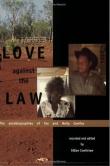AustLit
Latest Issues
AbstractHistoryArchive Description
'During his life, Tex Camfoo has been classified as Aboriginal, half-caste and European. As a half-caste he could not legally associate with or marry an Aboriginal woman. As an Aboriginal, he was not allowed to visit the pub with his European work mates.'
'Nelly Camfoo was always considered Aboriginal. From childhood she has taken part in ceremonial life. She finds white people both frustrating and foolish - 'they can't understand because they can't listen'.'
'The stories of Tex and Nelly Camfoo intermingle to highlight the ambiguous social position of Aboriginals living in the Northern Territory during the last century. They provide insight into race relations, the contradictory attitudes of missionaries and police, they reflect morality and religion as well as recent political developments.' (Source: Publisher's website)
Publication Details of Only Known VersionEarliest 2 Known Versions of
Works about this Work
-
‘That Old Man Making Fun of Me’ : Humour in the Writings of Aboriginal and Asian Relationships
2019
single work
criticism
— Appears in: JASAL , vol. 19 no. 2 2019;'This article explores the role of humour in three contemporary Aboriginal texts that document Aboriginal–Asian relationships. Humour in Aboriginal texts has mostly been studied with reference to the ostensible binaries between Aboriginal and European, Black and White, colonised and colonisers. Scant critical attention has been paid to the place of humour in revealing and concealing the dynamic interrelations between Aboriginal people and Asian immigrants living under a colonial regime. This article investigates humour as a textual device that transmits subversive ideas contesting stigma and stereotypes of Aboriginal and Asian peoples regarding their identities, bodies, and inter-racial intimacies. Through close readings of Alexis Wright’s novel Plains of Promise (1997), Tex and Nelly Camfoo’s autobiography Love against the Law (2000) and Anita Heiss’s historical romance Barbed Wire and Cherry Blossoms (2016), this article considers three specific modes of humour in Aboriginal texts: self-deprecation, puns/wit, and boasting. The article contends that these different forms of humour draw attention to a range of unsettling issues and power relations concerning oppression and resistance, stigmatisation and normalisation, institutional control and surveillance. Further in each of these texts humour works to deconstruct images of discrete and maligned racialised otherness.' (Publication abstract)
-
y
 United by the Sweep of a Tarnished Brush
Canberra
:
Australian National University
,
2000
Z939967
2000
single work
essay
United by the Sweep of a Tarnished Brush
Canberra
:
Australian National University
,
2000
Z939967
2000
single work
essay
Briefly outlining white Australians' attitudes to Chinese settlers in Australia, the authors note the often close relationships between Chinese and Aboriginal people, the effect of the land rights movement in motivating people of mixed race to identify as Aborigines, and the trend to increased recognition of dual and multiple ancestries.
-
y
 United by the Sweep of a Tarnished Brush
Canberra
:
Australian National University
,
2000
Z939967
2000
single work
essay
United by the Sweep of a Tarnished Brush
Canberra
:
Australian National University
,
2000
Z939967
2000
single work
essay
Briefly outlining white Australians' attitudes to Chinese settlers in Australia, the authors note the often close relationships between Chinese and Aboriginal people, the effect of the land rights movement in motivating people of mixed race to identify as Aborigines, and the trend to increased recognition of dual and multiple ancestries.
-
‘That Old Man Making Fun of Me’ : Humour in the Writings of Aboriginal and Asian Relationships
2019
single work
criticism
— Appears in: JASAL , vol. 19 no. 2 2019;'This article explores the role of humour in three contemporary Aboriginal texts that document Aboriginal–Asian relationships. Humour in Aboriginal texts has mostly been studied with reference to the ostensible binaries between Aboriginal and European, Black and White, colonised and colonisers. Scant critical attention has been paid to the place of humour in revealing and concealing the dynamic interrelations between Aboriginal people and Asian immigrants living under a colonial regime. This article investigates humour as a textual device that transmits subversive ideas contesting stigma and stereotypes of Aboriginal and Asian peoples regarding their identities, bodies, and inter-racial intimacies. Through close readings of Alexis Wright’s novel Plains of Promise (1997), Tex and Nelly Camfoo’s autobiography Love against the Law (2000) and Anita Heiss’s historical romance Barbed Wire and Cherry Blossoms (2016), this article considers three specific modes of humour in Aboriginal texts: self-deprecation, puns/wit, and boasting. The article contends that these different forms of humour draw attention to a range of unsettling issues and power relations concerning oppression and resistance, stigmatisation and normalisation, institutional control and surveillance. Further in each of these texts humour works to deconstruct images of discrete and maligned racialised otherness.' (Publication abstract)



